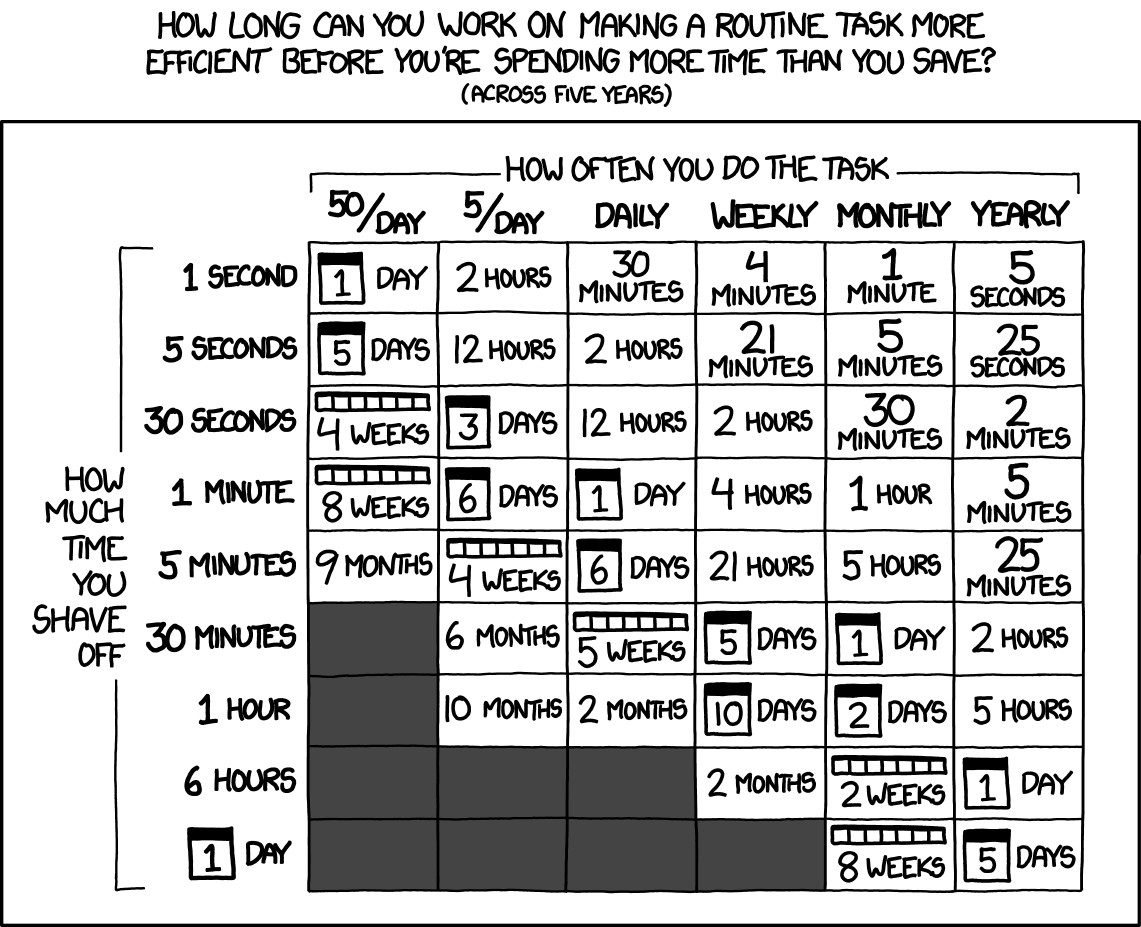Accumulation is real... and fast.
Seconds add up fast, quickly forming minutes, then hours, then more. As usual, xckd has something for this:

Take a few examples with rough approximations:
10 seconds/event * 10 event/day * 7 day/week = 12 min/week = 12 hr/year
Alfred is then 42.5% faster than manual searching. I've used Alfred 1146 times between 03 April 2020 and now (18 August 2020), giving me an approximate total usage time of 1146 search * 3.12 sec/search = 3576 sec = 1.00 hr. Had I kept the manual method, I would have spent 6211 sec = 1.72 hr. Not a huge difference, but it absolutely adds up over many years.
(Note that this assumes all 1146 uses are internet searches, which they aren't. I regularly use Alfred for file searching, which takes significantly more time because I have to click through many layers of folders, e.g., going to a file in /Users/../knowledge/texts/human_accomplishment/media takes 11.34 sec, while using Alfred takes 2.27 sec. This increases time saving significantly, but was not used to keep the math simple.)
... 3,520 minutes, or 58.6 hours, spent waiting at red lights every 365 days. ... you’ll have spent 2,930 hours sitting at stop lights before you even retire. ... that’s 122 days—or about 4 months of your lifeDriving (safely) through a yellow light every few opportunities gives hours of the year back.
Bulk preparation of food for the week, also called meal prep(aration), is a popular way of minimizing cooking. Cooking a decent meal for dinner 6 days out of the week takes 30-45 minutes, for a total of 6 * 0.75 = 4.5 hours per week. Preparing meals in bulk takes longer than an individual meal, but not by much (assuming you have the cooking tools to do so). So, if meal prepping takes 2-3 hours one day out of the week, then the time saved is 1-1.5 hours per week, or 52 * 1.5 = 78 hours per year. Another method to further save time is using a slow cooker. Requiring only 0.5-1 hours of preparation, the cooker can be programmed to turn on to a certain temperature, hold there for a set time, then turn to "Warm" setting after the time completes, allowing you to meal prep while at work.
Alice = 20 min/day * 250 day/yr = 80 hr/year spent commuting
Bob = 40 min/day * 250 day/yr = 160 hr/year spent commuting
While the math is obvious, explicitly stating numbers puts things in perspective: Alice gets 80 hours of her life back if she lives 20 minutes closer to work! The same math applies for having to drive places for attractions.10 email/day * 2 s/email * 250 work day/year = 83 min spent typing signatures per year
Not filtering useless emails is a similar time suck, both for time spent figuring out if it's important and sifting through the horde of useless emails to find the one:30 email/day * (5 s/email (imp?) + 5 s/email (search))) * 250 work day/year = 21 hours looking through emails
And some suggested solutions for each of the above:
The first step of taking time back is awareness. Figure out where time is going and why it's going there. Do not underestimate the cumulative affect of second waste—saying "it only takes a few seconds" trivializes the situation and discourages looking for improvements.
From there, ask how to can be reduced, eliminated, or double-upped on and aggressively look for solutions.
Time accumulation can manifest itself in multiple forms, both individually and concurrently:
Reduction or elimination is simple (and often easier than anticipated) at a task- and environment-level:
Combining these two steps results in a straightforward plan:
Time is the most valuable commodity. Stop wasting it.